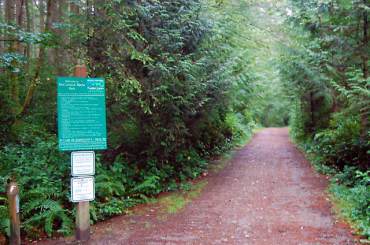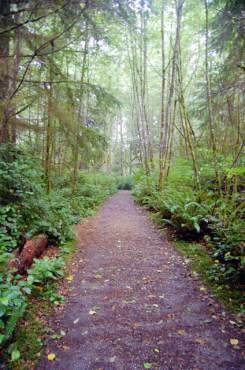
Perhaps John Muir, the great American environmentalist, said it best: “In every walk with nature, one receives far more than he seeks.”
You probably know that exercise in general is good for us and that we are lucky enough to live in the Pacific Northwest, arguably the greatest area for trail endeavors in the United States. But what you might not know is just why exploring trails is a great way to stay healthy and happy.
Trails cost nothing to enjoy, yet give us benefits worth more than money can buy. You certainly can invest in gear and apparel but you can also step outdoors today with whatever you have in your closet and be off to a great start.
Exploring trails is an ideal activity for families to participate in together. No matter your experience, athletic ability, age health or interest level, trails have something to make everyone H.A.P.P.Y.
H: Health
Trails provide the perfect setting for improving and maintaining overall health. Aerobic exercise — the kind that gets your heart rate up — is one of the most important things you can do to improve health. It has immediate positive effects on your heart, intestines, bones and blood, and while we know this, it can still be hard to get going.
The trails provide added incentive in their beauty, relative coolness and lack of (digital and industrial) noise.
Finding a way to enjoy aerobic activity leads to continued participation, as studies such as this Canadian “30×30 Nature Challenge” have shown. Regular exercise leads to weight control, which leads to a host of benefits, including decreased strain on joints, decreased blood pressure, improved reproductive and pregnancy health, improved sleep, decreased risk for chronic health diseases like diabetes and decreased levels of depression and stress.
A: Attention, Actions, Attitudes
Another benefit of trail exercise is improvement in attention, actions and attitudes. Studies show that spending time in nature improves attention span in children with ADHD. Research has suggested increased focus and creativity after time in nature, which has added benefits in the workplace and personal life.
It has also been shown across all age groups that time in nature — such as a hike, run or walk on the trails — leads to decreased “negative” feelings like anger, frustration and anxiety and increased feelings of wellbeing.
P: Peace
People who regularly engage with nature by way of hiking, camping or running on trails report decreased levels of stress, anxiety and hopelessness and increased feelings of peace and calmness. For many, this is a time to focus on spiritual health through silence, meditation, mindfulness, prayer and gratitude.
Stress reduction leads to improvements mentally and emotionally; however, what might be underrecognized are the physiological effects of stress on the body. When we encounter stressful situations, our body reacts by producing hormones and substances (such as cortisol and adrenaline) that are intended to prepare us to fight or run — basically to survive.
These finely tuned processes serve important purposes in life-and-death situations, but can wreak havoc on a body when the short-lived situations they were developed for are instead prolonged, daily occurrences. In one study, the benefits were seen in just five minutes — reminding us that “I don’t have time” is not an acceptable excuse.

(Photo by Kathryn McIvor)
P: People, Planet
Another benefit to being in nature is a deeper appreciation of our place with other people on this planet. On the trails ,you meet like-minded people, sometimes nodding quietly, sometimes stopping for conversation or to point out an element of nature not to be missed.
Away from digital demands, we can focus on the people and world around us and be grateful for the benefits they provide. Research has shown that people who intentionally spend time in nature report feeling more connected to the world and demonstrate more responsibility for its care — things we all benefit from.
Y: Youth
If you were born before 1985, you likely remember days spent outside — climbing trees, building forts, riding bikes and participating in “unstructured play” until someone’s parent called you inside. Research suggests that the combined effects of increased “screen time” with the loss of unstructured play in nature is being linked to a multitude of diseases and disorders in children.
Studies are showing that youth who spend unstructured time in “green play” have improved health in a wide variety of areas, including asthma, depression, myopia and obesity. The same physical health benefits apply to children, and in a time when childhood obesity is at an all-time high and rising, this simple, free and fun form of exercise is the perfect antidote.
So what about you? Are you ready to get HAPPY on the trails? It just might be the single best decision you make all year.


























